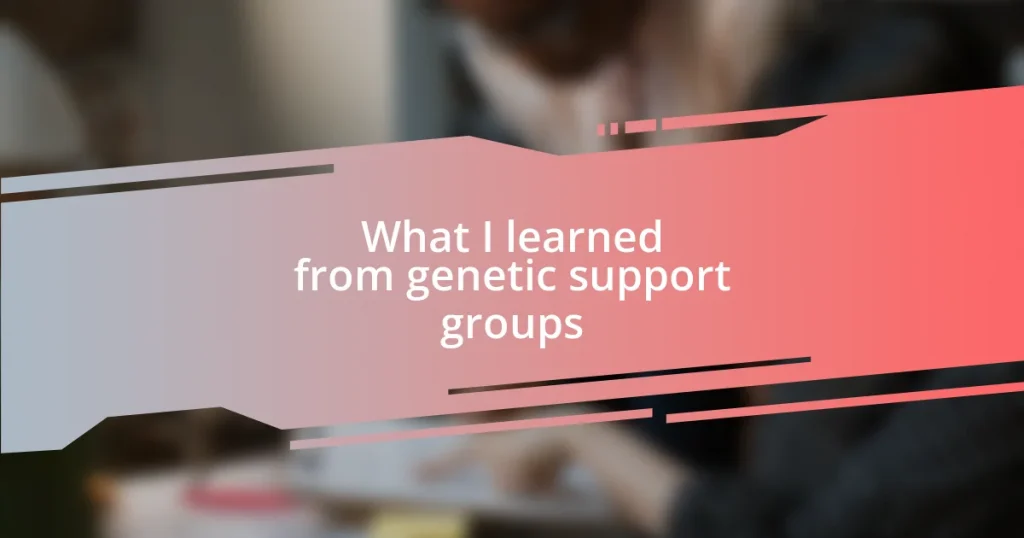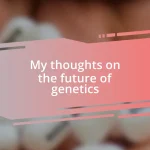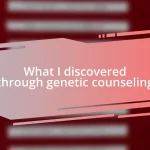Key takeaways:
- Genetic support groups foster deep emotional connections and provide a sense of community, helping members feel understood and less isolated in their experiences.
- Members share valuable insights, resources, and advocacy strategies, turning personal experiences into actionable knowledge that empowers individuals to navigate their health challenges effectively.
- Engaging in these groups often inspires ongoing connections and collaborative efforts, leading to personal growth and collective actions such as advocacy or educational initiatives within the community.
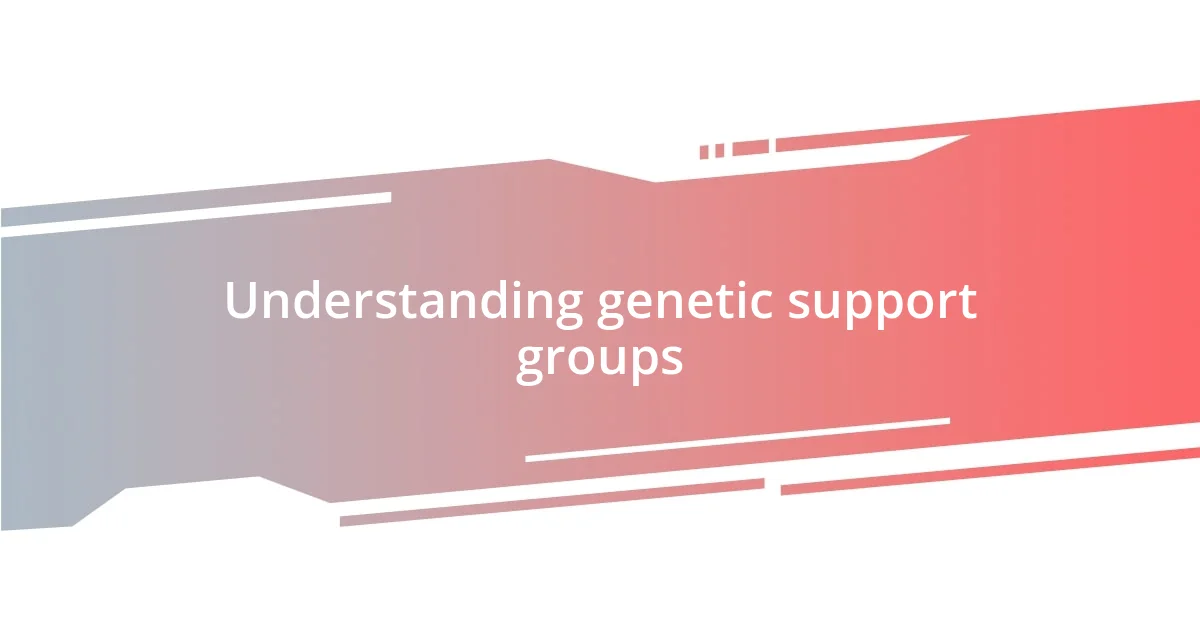
Understanding genetic support groups
Genetic support groups are unique spaces where individuals grappling with genetic conditions can connect. I remember the first time I attended one; it felt like walking into a room filled with people who understood my struggles without needing an explanation. Have you ever experienced that sense of belonging? It’s profound how shared experiences can break down isolation and foster community.
Within these groups, members often discuss not only the medical aspects but also the emotional weight of living with a genetic condition. For instance, I once shared my fears about future uncertainties and was met with a chorus of nods and understanding glances. It was a reminder that we all face similar challenges, reinforcing the idea that no one should navigate their journey alone. This emotional connection is what makes these groups invaluable.
Moreover, genetic support groups serve as valuable resources for information and advocacy. I’ve seen firsthand how members share insights about the latest research, treatment options, or even tips on how to communicate with healthcare professionals. Isn’t it empowering to access real-life experiences that put a human spin on clinical information? This blend of support and knowledge truly highlights the strength of community in the face of adversity.
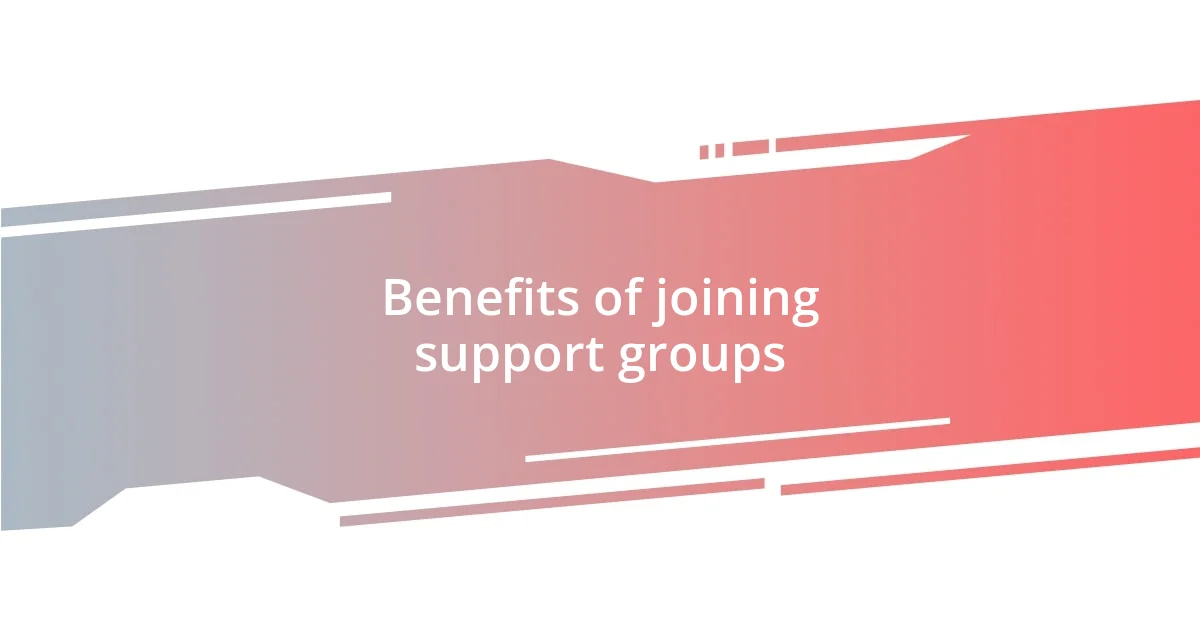
Benefits of joining support groups
Joining a support group can significantly reduce feelings of isolation. I remember attending my first meeting and being surprised by how quickly I felt understood. Sharing my journey, alongside others who faced similar challenges, created a bond that lifted the weight of loneliness I had carried for so long. It felt like the burdens were lighter together; that sense of camaraderie is something I cherish.
The benefits of joining support groups extend beyond emotional connection; they also offer practical support. Members often exchange tips and resources that can prove invaluable in daily life. Here are some specific advantages I’ve experienced:
- Emotional support: Being able to express fears and anxieties is healing.
- Shared knowledge: Gaining insights from others who have navigated similar experiences.
- Resource referrals: Discovering professionals and services that can help.
- Advocacy opportunities: Finding strength in numbers when facing healthcare systems.
- Friendship and social connections: Building lasting relationships outside of the group setting.
These groups are not just about sharing struggles; they provide a comprehensive network of support and resources that can positively transform your experience.
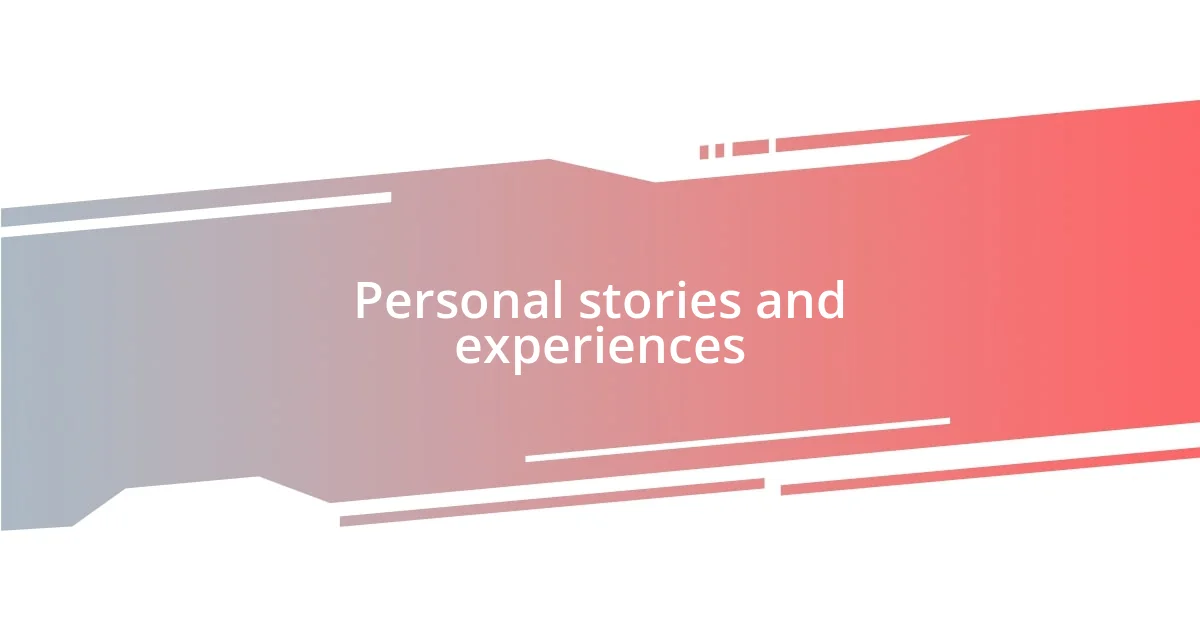
Personal stories and experiences
I have been moved by the stories I’ve heard in genetic support groups. One member shared her journey of raising a child with a rare genetic disorder. Listening to her talk about the challenges of navigating school systems and medical appointments brought back my own memories of advocating for my own health needs as a child. Those shared narratives create a tapestry of experiences that bind us together in understanding and empathy.
At one of the meetings, another individual recounted how finding a community helped her reconnect with her identity beyond her diagnosis. It reminded me of my early days post-diagnosis when I felt lost. Her story inspired me to embrace my traits, both unique and challenging, rather than solely focusing on the labels. It’s amazing how personal tales can spark a shift in perspective.
I also witnessed someone bravely share their most vulnerable thoughts about feeling like a burden on their family due to their condition. The room fell silent, and I felt a collective breath as we all absorbed their pain. In that moment, we leaned into the discomfort together, offering a space of understanding and healing. Moments like these illustrate the depth and strength of our connections; they highlight how sharing personal experiences can be the catalyst for growth and solidarity in a way that feels truly transformative.
| Personal Stories | Emotional Insights |
|---|---|
| A member’s journey raising a child with a rare condition | Shared challenges foster empathy and support |
| Discovering identity beyond diagnosis | Encouragement to embrace uniqueness |
| A vulnerable share about feeling like a burden | Creating transformative moments of understanding |
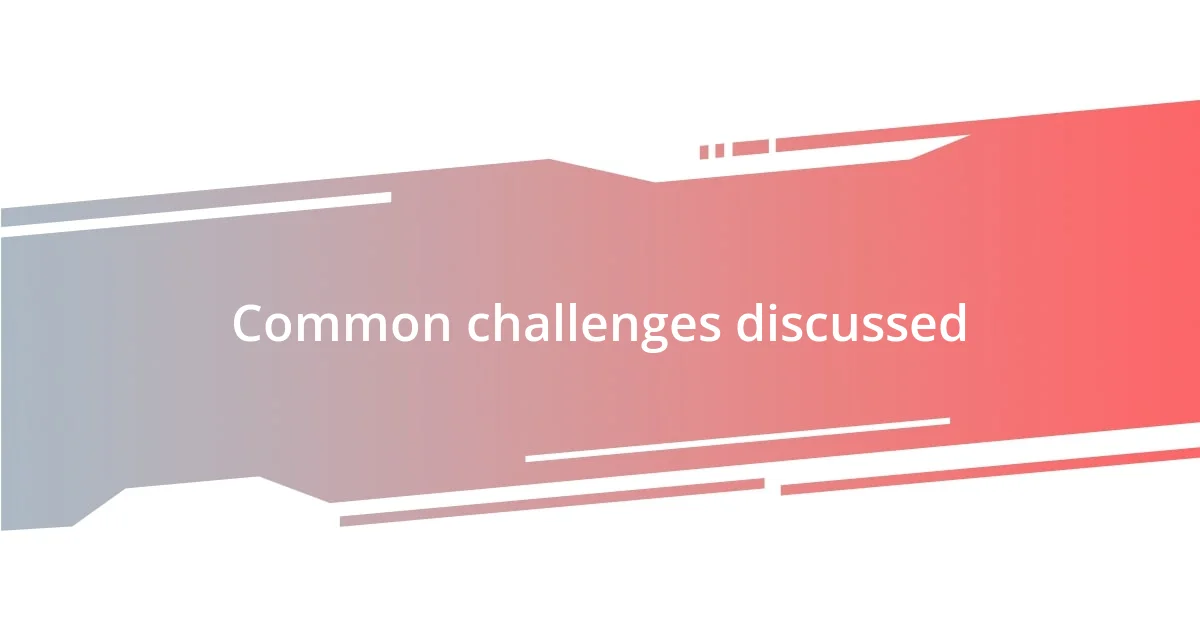
Common challenges discussed
Navigating the complexities of genetic conditions often brings a unique set of challenges that many members discuss openly. One of the recurring topics is the emotional toll of diagnoses—how do we cope when uncertainty becomes part of our daily lives? I’ve experienced moments when I woke up consumed by what-ifs, questioning not just my health but my future. Sharing these feelings within the group shed light on a universal struggle, reminding me I wasn’t alone in my fears.
Another common challenge we often tackle is the quest for clear communication with healthcare providers. I’ll never forget one meeting where a member expressed her frustration over the jargon-filled conversations with doctors. It made me reflect on my own experiences; those medical terms can feel like barriers rather than bridges. We shared tips on how to ask the right questions and advocate for our needs, transforming what could be intimidating into an empowering skill set.
Financial strain is another difficulty many face, and it’s often left unspoken. I recall someone revealing the heavy burden of medical bills tied to treatments that seemed endless. The group immediately jumped in, offering resources and advice on navigating insurance claims. Isn’t it comforting to know that together, we can brainstorm solutions to alleviate some of these pressures? Having a network that understands these shared stressors not only brings relief but fosters a sense of solidarity in overcoming financial challenges.
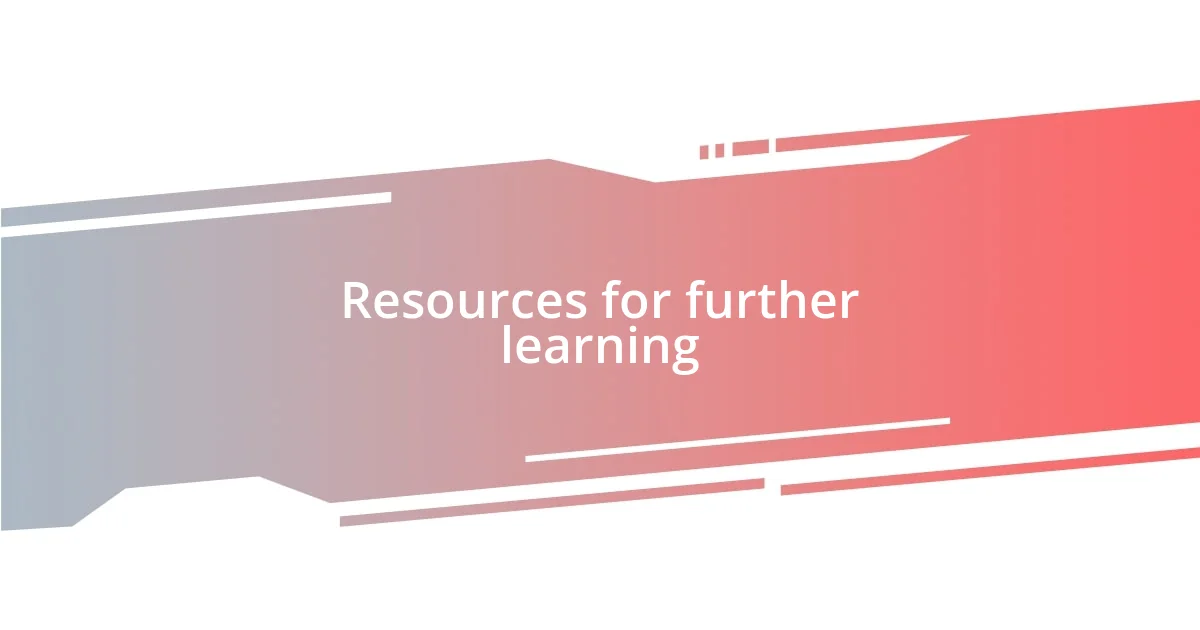
Resources for further learning
There are plenty of educational resources out there for anyone looking to dive deeper into the world of genetic conditions. I’ve personally found online forums and websites, like Global Genes, incredibly helpful. They provide articles, webinars, and even virtual meetups where you can learn directly from experts and connect with others grappling with similar issues.
Books are another treasure trove of insights. I remember picking up “The Gene: An Intimate History” by Siddhartha Mukherjee, and it was eye-opening. Not only did it explain complex genetic concepts in layman’s terms, but it also told compelling stories that made those concepts resonate on a personal level. Have you ever read something that completely shifted your understanding? This book did that for me, bridging the gap between science and personal narrative beautifully.
Don’t underestimate local support groups, either. I discovered one in my area that offers educational workshops alongside emotional support. Attending a session on genetic testing and its implications made me realize how essential it is to stay informed. Every piece of knowledge empowers you to make better decisions about your health, and being part of a community that values learning together feels uplifting.
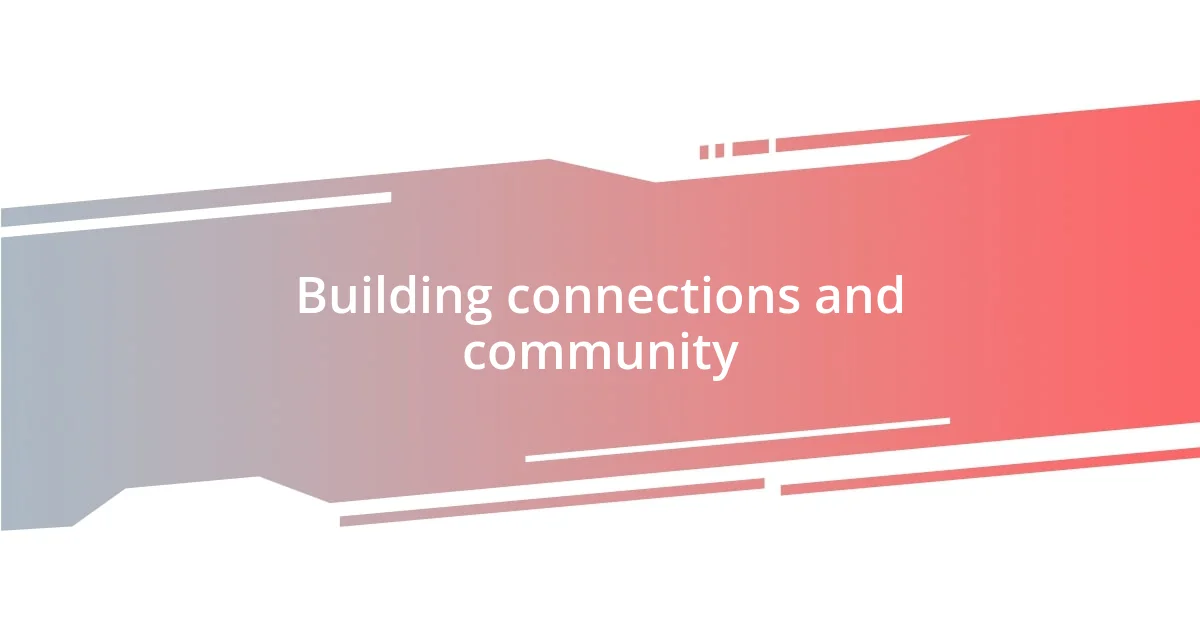
Building connections and community
Finding a sense of community in genetic support groups is like discovering a new family. I still remember the first time I walked into a meeting; I was nervous but instantly felt warmth envelop me like a cozy blanket. We exchanged stories that stirred emotions I didn’t even know I had bottled up. That connection—knowing there are others who genuinely understand—is invaluable. Have you ever felt so seen and heard in a room full of strangers?
One experience that stood out for me was the time we organized a potluck. Sharing food naturally sparked conversations, and it was incredible to see barriers dissolve over a shared meal. I had the chance to share a dish tied to my heritage and hear about others’ personal recipes, each dish carrying a story. It made me realize how food can bring us together, fostering community bonds that extend beyond our genetic concerns.
Moreover, I’ve found that these gatherings often evolve into something deeper. We’ve spent evenings brainstorming ways to support one another outside of meetings—whether it’s checking in via text during tough times or helping each other complete daunting paperwork. I think it’s this ongoing support that truly solidifies our connections. Doesn’t it feel reassuring to know that you have a network ready to lift you up, no matter what challenges arise?
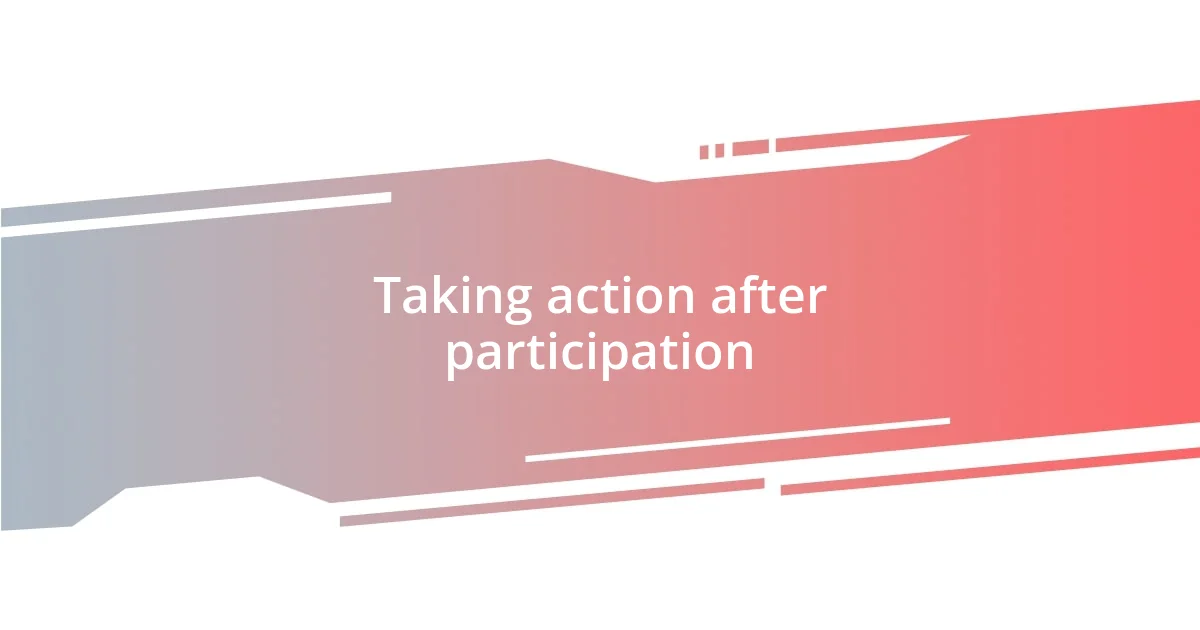
Taking action after participation
Taking action after participating in genetic support groups often involves harnessing the knowledge and connections gained during these sessions. I remember after one particularly enlightening discussion on genetic testing, I felt an urgency to talk to my healthcare provider about my family history. It was like flicking a switch; suddenly, the information wasn’t just theoretical anymore—it was real and actionable. Have you ever left a meeting feeling empowered to take charge of your health?
In my experience, the action items that follow participation can vary greatly. I’ve seen some individuals decide to initiate their own research projects or even advocate for genetic testing policies in their communities. I recall a fellow group member who started a blog sharing her journey and resources, bridging gaps for those who might feel lost. This shows the incredible ripple effect of our collective experiences—doesn’t it inspire you to think about how you can contribute to this dialogue?
Moreover, I’ve found that simply keeping in touch with fellow members post-participation encourages ongoing reflection and action. I often reach out to check in and share new resources I’ve stumbled upon. It’s fascinating how those small acts, like sending an article or discussing recent breakthroughs, can lead to collective action, whether it’s organizing events or collaborating on educational initiatives. Don’t you think every connection has the potential to spark something amazing?










